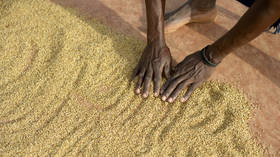Russia increasing wheat exports to Africa

Wheat exports from Russia’s Krasnodar Region to 25 African countries increased by 14.4% between January and September 2024, totaling 14.8 million tons, the Center of Grain Quality Assurance reported on Wednesday.
The government body said the top five African importers of Russian wheat by volume were Egypt (6.8 million tons), Algeria (1.3 million tons), Kenya (1.2 million tons), Libya (1.0 million tons), and Sudan (0.6 million tons).
Over August 25-31, the first shipments of Russian wheat from this year’s harvest were dispatched from Krasnodar Region ports to the Democratic Republic of the Congo and Eritrea. The former received 17.2 thousand tons, while the latter received 31.5 thousand tons.
“This year, wheat shipments resumed to Gambia, Djibouti, and Ethiopia,” the Center’s press service announced.
According to the statement, the wheat undergoes rigorous quality and safety assessments at laboratories before being exported. The tests cover toxic elements like lead, cadmium, arsenic, mercury, mycotoxins, and contamination from impurities.
The Center of Grain Quality Assurance operates 16 branches and 18 testing laboratories in the main grain-producing regions of Russia. It conducts product assessments according to detailed test protocols, issuing safety, quality, and GMO-free certificates to exporters, and ensuring that all shipments meet the stringent requirements of the importing countries.
In May, Russian Agriculture Minister Oksana Lut told a plenary session on food security at the international ‘Russia’ exhibition that grain exports are expected to rise to more than $55 billion by 2030, and added that the ministry also expects Russian farmers to boost production by 25% within six years in order to meet the president’s targets. The minister later announced that domestic grain exporters would be turning their focus to key markets in North Africa.
Russia became Morocco’s primary wheat supplier that same month, surpassing France, which had held the position since 2019. According to a local news agency, Morocco imported over 61,800 tons of wheat from Russia in May, representing approximately 26% of all wheat imports. Poland emerged as the second-largest supplier, while France fell to third place.
In April, Russian President Vladimir Putin called on the country’s agricultural sector to increase exports 50% by 2030 compared to figures recorded in 2021. The country’s exports of agricultural produce amounted to $37 billion that year.
At a meeting with the president in February, then Agriculture Minister Dmitry Patrushev reported that Moscow had successfully delivered 200,000 tons of wheat to six low-income African nations, free of charge, making it the biggest humanitarian initiative ever conducted by Russia.













